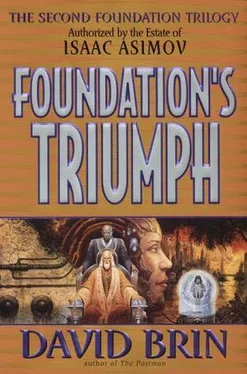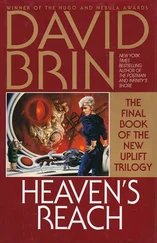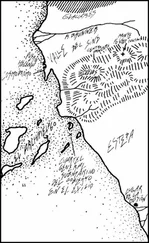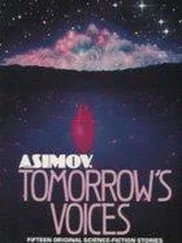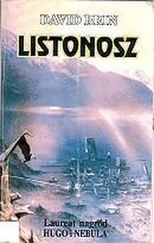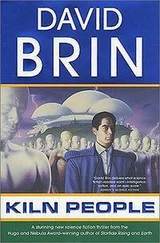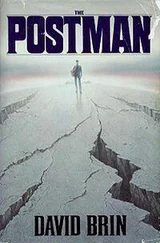David Brin - Foundation’s Triumph
Здесь есть возможность читать онлайн «David Brin - Foundation’s Triumph» весь текст электронной книги совершенно бесплатно (целиком полную версию без сокращений). В некоторых случаях можно слушать аудио, скачать через торрент в формате fb2 и присутствует краткое содержание. Год выпуска: 1999, ISBN: 1999, Издательство: Harper Prism, Жанр: Фантастика и фэнтези, на английском языке. Описание произведения, (предисловие) а так же отзывы посетителей доступны на портале библиотеки ЛибКат.
- Название:Foundation’s Triumph
- Автор:
- Издательство:Harper Prism
- Жанр:
- Год:1999
- ISBN:ISBN: 0-06-105241-8
- Рейтинг книги:4 / 5. Голосов: 1
-
Избранное:Добавить в избранное
- Отзывы:
-
Ваша оценка:
- 80
- 1
- 2
- 3
- 4
- 5
Foundation’s Triumph: краткое содержание, описание и аннотация
Предлагаем к чтению аннотацию, описание, краткое содержание или предисловие (зависит от того, что написал сам автор книги «Foundation’s Triumph»). Если вы не нашли необходимую информацию о книге — напишите в комментариях, мы постараемся отыскать её.
Foundation’s Triumph — читать онлайн бесплатно полную книгу (весь текст) целиком
Ниже представлен текст книги, разбитый по страницам. Система сохранения места последней прочитанной страницы, позволяет с удобством читать онлайн бесплатно книгу «Foundation’s Triumph», без необходимости каждый раз заново искать на чём Вы остановились. Поставьте закладку, и сможете в любой момент перейти на страницу, на которой закончили чтение.
Интервал:
Закладка:
Of course this is a farce, Hari thought. Our captors have the ability to subdue Planch any number of ways, from sedating him to altering his memories. So why don’t they? Is Gornon trying to demonstrate something, through his forbearance?
Hari found himself rooting for Mors Planch, especially since it wouldn’t matter much if the man did get away. As an outlaw, the raider captain could hardly go to the police or galactic news media with his wild story. And it was probably too late for him to affect Ktlina’s renaissance, whose doom was already a. foregone conclusion. Anyway, since these robots were avowedly opponents of Hari’s friend, Daneel, he didn’t owe them anything. In fact, he had every reason to delay their departure from Pengia.
Hari had an idea how to achieve that.
“I must insist that we bring the young lady with us, on our journey,” he told Gornon, late on the second day. “You said Trantor would be our ultimate destination, after the next stop. Jeni belongs with her parents. We have no right to leave her among strangers, stranded in some galactic backwater.”
The robot Gornon demurred.
“She is still recovering from her illness.”
“The local doctors broke her fever, and she seems past the crisis.”
“Yes, but the next phase of our voyage may involve danger. There will be upsetting situations before Trantor finally comes into view. Are you willing to put the young woman through that, Professor?”
R. Gornon’s vague but ominous description of their coming journey made Hari even more eager to delay these Calvinian zealots, in hope that Daneel’s forces would arrive in time.
“You have met and spoken with Jeni,” he told Gornon. “She’s exceptional in many ways. Her destiny ultimately lies on Terminus, where the Foundation will have great need of resourceful people like her.”
In fact, Hari knew better. While Jeni would make a wonderful citizen of the bold new civilization that was being founded at the galaxy’s far periphery, she wasn’t essential. No individual was. The equations of psychohistory would operate with or without her, unfolding as he had foreseen. At least for the first two or three centuries.
Still, Hari had come to realize that R. Gornon was quite different from the Calvinians back on Trantor. This fellow’s sect did not oppose the Seldon Plan. In fact, Gornon clearly approved, at some level. So Hari’s argument carried weight.
“Very well then, Professor. We will give her another day of rest. Then we must depart, whether she is ready or not.”
Hari could tell this was the limit of Gornon’s flexibility.
Well, Daneel, I’ve given you one more day to find us. But you better hurry.
One question he refrained from asking. Why had the robot not simply used some of the “supermedical technologies” to cure Jeni right away? Clearly this particular cult believed in a minimalist approach, interfering in human affairs only insofar as it was absolutely necessary to achieve their goals.
Perhaps that’s why they did so little to me in their magical rejuvenation machine. Whatever I’m supposed to do for them can be accomplished in the next few weeks. No sense in giving additional decades to an old bastard like me, when a month or two will do.
4.
Zun Lurrin observed Daneel’s ship streak away from Eos, briefly illuminating the lake of frozen mercury with its actinic flare. He watched until the speedy vessel made its first hyperspace jump, swooping toward the galaxy’s shimmering wheel. Without having to navigate dust lanes or fight the gravity eddies of ten billion stars, the craft should make excellent time streaking toward its destination.
A message from one of Daneel’s agents had provoked the leader of all Zeroth Law robots into a blur of activity, rushing through preflight operations and departing with only a few words of instructions for Zun.
“I’m leaving you in charge,” the Immortal Servant had said. “Here are access codes to my personal data files, in case I don’t return at the expected time.”
“Is the situation truly so dire?” Zun had asked, with concern.
“Several forces are at work, some of which are not easily factored into my calculations. I would guess there is a small but significant chance that I will fail.
“Even if I do, however, the plan we have been discussing here must not! The ultimate hope for human happiness lies within our grasp. But it is, as yet, a slender prospect. There will be many crises before our masters finally unify, coalesce, achieve their true potential, and take command once again.”
Only an hour later, Zun watched with eyes that were capable of detecting even the backwash ripples of Daneel’s hyperspatial wake. He now shared the same vision, the same determination, as his leader.
“I will not let you down,” he murmured with a mentalic benediction. “But do not fail to return, Daneel. Yours is not a burden that I would carry easily.”
5.
To pass their third and final day, Hari asked for an excursion through Pengia Town. He wanted one last look at normal galactic society-where the old empire still functioned smoothly-hoping to check out a notion or two about psychohistory. R. Gornon Vlimt personally accompanied Hari, piloting an open touring car of the kind favored by minor planetary gentry.
It wasn’t much of a municipality, less than a million, with most of that dispersed in cozy little cantons, each one somewhat self-contained. Although Pengia’s economy was primarily agrarian, there were a few factories, to produce the machines that made life comfortable-from cooler units to home amusement centers-designs that had changed only incrementally across hundreds or even thousands of years. After ages of gradual refinement, most of the tools people used were outstandingly durable, taking centuries to wear out. Buying a replacement was unusual, perhaps even a little shameful, like not taking proper care of a family heirloom. Hence, only a few sophisticated factories were needed to supply the planet’s needs.
Nondurable goods were another matter. Everything from pottery to furniture to clothing was produced by guilds, controlled by master craftsmen whose authority over their journeymen and apprentices went unquestioned. Most of the galaxy’s ten quadrillion people lived in much the same way.
Hari recognized the trademarks and rhythms of a deeply traditional, semi-pastoral society, needing only a few real engineers, and even fewer scientists. No wonder he had been forced to cast a wide net to recruit the hundred thousand first-rate experts who would make their new home on Terminus. Even the energy systems on Pengia were based largely on renewable sources-solar, tide, and wind-with just a single proton-fusion power plant serving as a supplement. And there was talk of giving up that sophisticated “atomic” unit-replacing it with a deuterium-based model, less efficient but far simpler to maintain.
Hari mentally juggled psychohistorical formulae, noting the elegant damping mechanisms that Daneel and his colleagues had included when they designed a Galactic Empire for humanity, fifteen thousand years ago. Having read A Child’s Book of Knowledge, Hari marveled how many of the same techniques existed back in ancient China, long before the first technological renaissance on Earth.
That prehistoric imperium had a system called bao jin- also called gonin-gumi in a nearby culture-that seemed quite similar to today’s tradition of communal accountability. An entire village or canton was responsible for training its young people in proper rituals and behavior…and the whole community was shamed if any member committed a crime. Any youth who chafed under this conformist system had but one hope-to win transfer over to the Meritocratic or Eccentric orders, because most common citizens had little use for individualists in their midst.
Читать дальшеИнтервал:
Закладка:
Похожие книги на «Foundation’s Triumph»
Представляем Вашему вниманию похожие книги на «Foundation’s Triumph» списком для выбора. Мы отобрали схожую по названию и смыслу литературу в надежде предоставить читателям больше вариантов отыскать новые, интересные, ещё непрочитанные произведения.
Обсуждение, отзывы о книге «Foundation’s Triumph» и просто собственные мнения читателей. Оставьте ваши комментарии, напишите, что Вы думаете о произведении, его смысле или главных героях. Укажите что конкретно понравилось, а что нет, и почему Вы так считаете.
